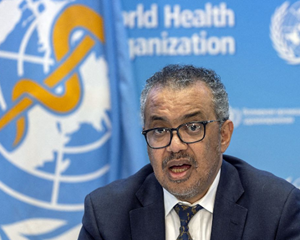"It is therefore with great hope that I declare COVID-19 over as a global health emergency."
“我满怀希望地宣布,新冠肺炎疫情作为全球卫生紧急事件的时代已经结束.”
The Director-General of the World Health Organization on Friday announced he was ending the emergency he declared for COVID-19 more than three years ago,
世界卫生组织总干事于周五宣布,将结束三年多前他宣布的这一新冠肺炎紧急状态,
marking a major milestone in the pandemic that has killed more than 6.9 million people, disrupted the global economy and ravaged communities.
而这也是新冠肺炎疫情的一个重要里程碑,该疫情截止目前已造成超过690万人死亡,扰乱了全球经济,破坏了社区。
"COVID has changed our world."
“新冠肺炎疫情改变了我们的世界。”
The move comes a day after the WHO Emergency Committee recommended the UN-agency declare an end to the coronavirus crisis.
一天前,世卫组织突发事件委员会建议,世卫组织应宣布新冠病毒危机的结束。
But the WHO chief warned that the end of the emergency did not mean COVID was over as a global health threat.
不过世卫组织总干事警告称,紧急状态的结束并不意味着新冠疫情作为全球健康威胁的结束。

"The worst thing any country could do now is to use this news as a reason to let down its guard,
“任何国家现在可能做的最糟糕的事情,就是利用这一消息作为放松警惕的理由,
to dismantle the systems it has built, or to send a message to its people that COVID-19 is nothing to worry about.
拆除其建立的系统,或者向其人民发出信息,说新冠肺炎没什么可担心的。
If we go back to how things were before COVID-19, we will have failed to learn our lessons, and failed our future generations."
如果我们回到新冠肺炎疫情之前的状态,我们将无法吸取教训,也将辜负我们的子孙后代。”
Ending the emergency could mean that international collaboration or funding efforts are also brought to an end or shift in focus,
结束紧急状态可能意味着国际合作或供资努力也将终止或转移重点,
although many have already adapted as the pandemic has receded in different regions.
尽管随着疫情在不同的区域消退,其中许多国际合作或供资努力已经做出了调整。












